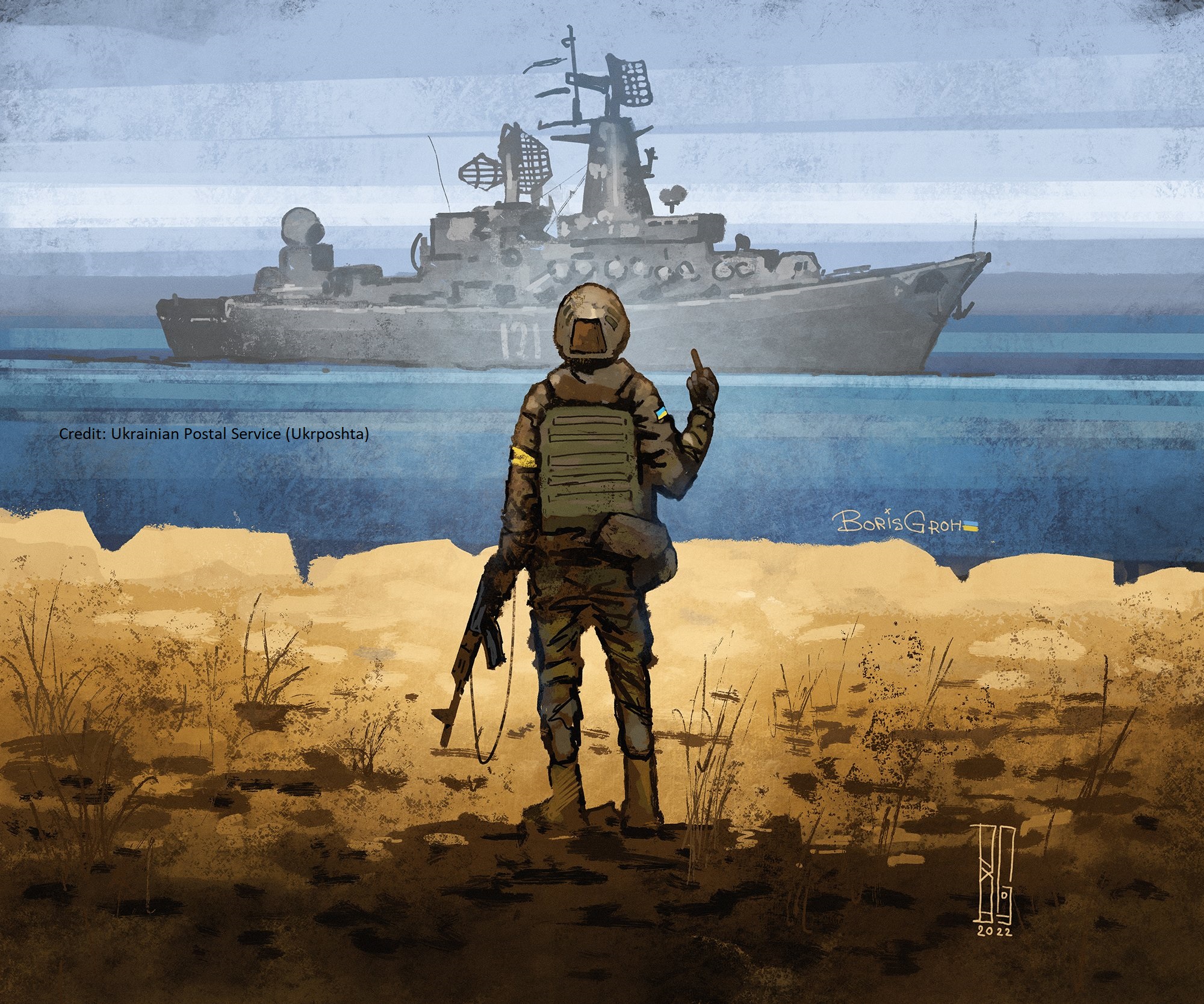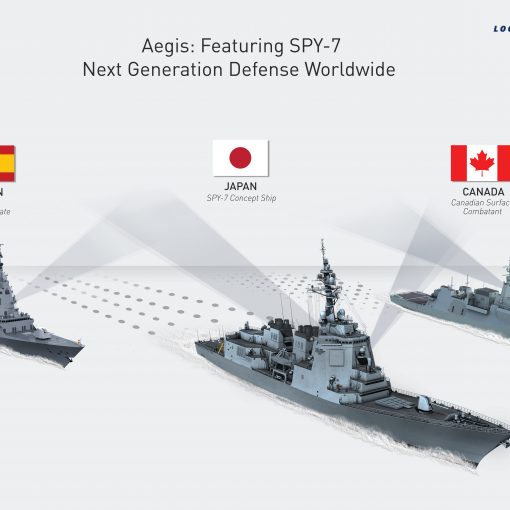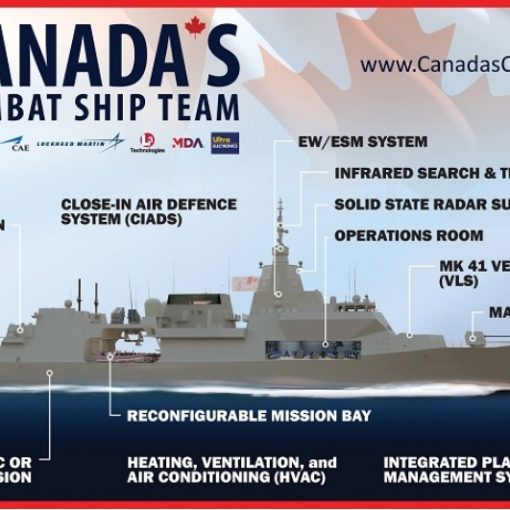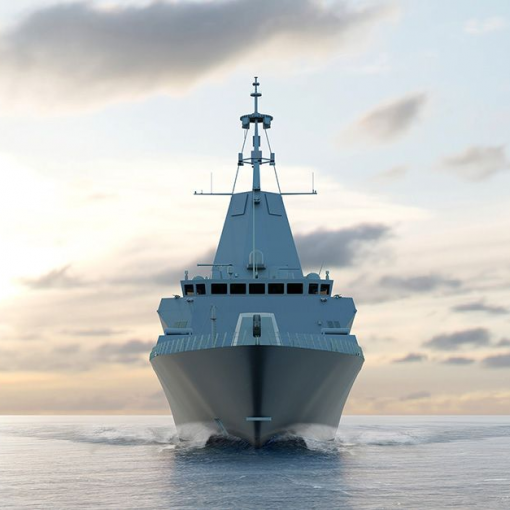By Dr. Rob Huebert, 20 April 2022
The ramifications of the sinking of Moskva on April 13 will be felt for a long time. This is the first sinking of a large warship in battle since the 1982 Falkland War. There have been some successful attacks that damaged American warships since 1982, but none were sunk. For Canada the lessons are clear. We need warships that have the best weapon and defensive systems that are available, and we need women and men that are trained to the highest levels possible. This is not cheap nor is it easy.
The attack that sunk Moskva occurred with an accuracy and speed that prevented the Russian crew from being able to mount any effective defence. Beyond knowing that the ship was sunk, there is not much known with any high degree of confidence. Widespread reports suggest that the Ukrainians used a missile known as a R-360 Neptune. This is a subsonic antiship cruise missile which is based on an earlier Soviet design know as a Kh-35. The Neptune has a reported speed of 300 kilometres per hour. Nevertheless, it is a new missile that the Ukrainians introduced in early 2021 to their forces.
In order for the attack to succeed, the Ukrainians needed to do at least two things. First, they needed to be able to pinpoint the position of Moskva. Such a target at sea that is moving is very hard to locate with the accuracy needed to achieve a direct hit. The ship was beyond visual range of the coast and the attack occurred at night, yet the Ukrainians were able to hit it. This suggests that they were using a system that directed the missiles to the ship probably using a means of locating the ship position that then sent that information to the missiles, all very difficult tasks. Second, the Ukrainians had to neutralize the defensive systems that Moskva carried to protect itself. These can be systems that directly engage any incoming missiles or aircrafts, or they can be measures that misdirect the attacking forces. None of the Russian systems were able to protect the ship. Some stories have emerged to suggest that the Ukrainians used drones to confuse the Russians systems, and this then allowed the missiles to successfully find the target and hit it.
There are 3 lessons for Canada. Canada is about to begin the construction of its new generation of major warship – commonly referred to as the Canadian Surface Combatant. The sinking of Moskva should make clear to all Canadians the challenges that any modern warship now faces. The Neptune is a modern missile, but both the Chinese and Russians are developing much more capable and even more deadly missiles. Some are known as hypersonic and can travel much faster -- 5-20 times the speed of sound -- and can maneuver. Open-source materials suggest that is almost impossible to stop these missiles once they are launched, so you need to locate and destroy the delivery systems before they are launched. This is very hard to do. Such challenges are only part of the reason why it is so difficult to build a modern warship and why they are so expensive as means of defending itself are developed.
The second lesson is that that Canada will need warships that can fight with its closest and strongest allies. Because of the speed and accuracy of the new missiles Canada will never have ability to independently maintain 360º surveillance around its own ships. It will always need to operate within the protective screen of friends and allies in any hostile environment but making its contribution. But to do so in a meaningful fashion will require the most advanced communication systems possible so it can always achieve a shared awareness of the environment no matter the conditions. It will also mean a very high level of continual training to ensure that the reaction time needed to defend Canadian ships is kept as good as possible and this comes only with constant training, on its own and with friends and allies.
The last lesson and most important lesson comes from examining the sinking of Moskva with the context of the recent Budget Speech. Deputy Prime Minister Freeland spoke in very stark terms when she delivered it. First, she made clear that as long as Vladimir Putin remained in power, Canada and all democracies were threatened and he needed to be “vanquished.” Second, she also made it clear that all the world dictators a similar threat and that “(w)e know that freedom does not come for free, and that peace is guaranteed only by our willingness to fight for it.” She was obviously including China. If she is right, then Canada can expect to find itself in a war to defend itself from these threats from both Russia and China. After seeing how fast Moskva was destroyed, a fight with the Chinese navy – which is numerically the largest in the world – will require we send vessels that are equipped with the very best weapons and defensive system possible, operated by women and men with the highest level of training.
The sinking of Moskva shows us what the women and men of the Royal Canadian Navy will face. The words of Freeland tell us why we will need the ships. It is time that we build the ships as soon as we can. And we need to build and operate the best that they can be. This will not be easier or cheap but it is necessary.






7 thoughts on “The Lessons of the Sinking of Moskva for Canadians”
Dan Middlemiss
Rob, this is an interesting and useful analysis. I would only add the following:
1. The gap between relatively inexpensive, highly effective anti-ship missiles and expensive surface warships and their defence systems is growing and will continue to grow. Potential adversaries, such as China, have amassed a large arsenal of these anti-ship weapons. Against a determined onslaught of these weapons, shipborne defences will eventually be overwhelmed. Moreover, as in the case of Canada’s CSC, canister-like anti-ship missile defence systems, such as the VLS mark 41 and the Sea Ceptor, cannot be reloaded at sea. This is a serious shortcoming for naval surface combatants.
2. We still do not know whether Ukrainian cyber-warfare and disinformation efforts played a role in the Moskva encounter, nor do we know whether Ukraine was assisted by friendly outside states in gathering tactical intelligence or other useful information.
3. Other states, such as China, are watching and learning lessons from this sinking as well.
4. Most disturbing of all, even under the best of circumstances, Canada’s CSC will not be ready in useful operational numbers for another 15 or more years. Canada cannot continue to subordinate the vital importance of delivering warships on time against secondary procurement objectives, such as providing jobs and other economic benefits to Canadian firms. Let’s get our procurement priorities right and speed up the process!
Hi Dan. Could not agree more with most of what you have said (especially para 4). The Moskva was a Command ship and most likely would have been part of a Russian Task Group (TG). As a High Value Unit (HVU) she should have been screened by other escorts as well as other destroyers nearby. Why there was no response from them is a mystery. If she were alone, she was then caught off-guard and the Ukrainians must have had very good intelligence of this or did a better job at cyber warfare and disinformation. This would never happen with the CSC frigate as she will always be part of a Canadian TG or part of an USN/allied force structure. With Cooperative Engagement Capability (CEC), the CSC frigate will always have other CSC or other allied ships to help respond to any in-coming surface or AAW threats. The CSC frigates will never be alone but will sail as part of a Canadian TG with their own HVUs (JSS) to protect. The CSC frigates’ main job will be to protect the force from enemy submarines but they also have a substantial AAW/AsuW capability. The MK 41 extended VLS system “could” carry SM 6 missiles that have a surface-to-surface mode as well as carry hypersonic missiles (fitted for but, at this time, not with). Why we did not buy some SM-6 missiles for the CSC with the SPY 7 radar she has is probably because of costs only at this time. I contend that the CSC frigate will be a much more effective ship than the 11,000 tonne Moskva destroyer/cruiser ever was, and their crew will be much better trained.
Great article Rob!
I also agree with most of what Dan M and Dave D have responded to. I would only add or perhaps re-emphasize that quite simply, the RCN (through the auspices of DND) make a clear strategic series of statements, as I think it requires more than one, regarding the imminent threat(s) to Canadian security and sovereignty, particularly in the Arctic approaches and North Atlantic.
As Rob so succinctly stated at the end of his piece…nothing about required procurement going forward will get “easier or cheap but it is necessary.” Absolutely!
The success of Ukrainian anti-ship missiles launched from land suggests that militaries that do not already possess such a capability, such as our own, might want to begin thinking about acquiring one. If we do, the most logical group to assign it to would probably be the Artillery branch, who could look at forming (or re-forming?) the 1st Garrison Regiment—or go all out and call the new missile capability what it is: coastal artillery. In any event, there ought to be a minimum of three batteries, one on each coast, with particular attention paid to the Arctic littoral. It might prove to be the cheapest method available to do something genuinely concrete about seaward defence in the Arctic.
Hello Brian. Most of what you say is true. A few THAAD Batteries would certainly be helpful however, the RCN already has an anti-ship missile (ASM) capability on the Halifax class in the Harpoon missile and the CSC Frigate will have a much better system in the NSM missile to be fitted. If Canada does enter the BMD program with the US, then it would just be a matter of buying some SM 6 and/or SM 3 missiles to be fitted in the ExL MK 41 Silos along with some CMS 330 Aegis software updates (Baseline 9-minimum). The SM 6 also has an Anti-Surface mode. But at $4-10M a shot, these missiles are not cheap and can only go into the MK 41 VLS silos one at a time, unlike say the ESSM.
An interesting analysis. My guess is that the Ukrainians had the help of US ISR aircraft to pinpoint the location of the Moskva. In addition, the Ukrainian missiles (possibly Neptunes and possibly not) were sea skimming missiles launched while the seas were choppy, making them harder to spot in the clutter. From my understanding of the photographs of the partially sunken Moskva, the fire control radars were in the normal stowed position, so the Moskva was blind to sea-skimming missiles.
The Ukrainians in previous days had apparently made feints toward the Moskva — then departed. The night of the sinking, it seemed as if the same feinting tactic was used, but by now, the Russians were inured to this tactic. It should be pointed out that the Russian Black Sea fleet had not been attacked by sea for two months of the war and they were probably complacent, believing that if the Ukrainians had anti-ship missiles, they would have used them by now. It should also be pointed out that the Russian military has not been behaving in a professional manner, and their Black Sea fleet is apparently no exception.
From my point of view the takeaway of the sinking of the Moskva is that when in combat, and within range of enemy missiles, all radar and defensive systems should be on and ready to react to a sudden attack. The other takeaway is what we have known for a while now and that is ground-based anti-ship missiles are very dangerous, and during combat, surface combatants need to stay out of range of land-based missiles unless an offensive act is planned, and then the tactic is to swoop into range, and back out of range as soon as possible.
Such an attack as on the Moskva could probably have been spotted and dealt with by ESSM or Sea Ceptors on the new Canadian Surface Combatant.
This is a 3 year old article, and a lot has happened since the sinking of the Moskva, but I think the lessons from there in many respect are clear. In evaluating such, one really needs also, in my view, to examine what has recently transpired in the Gulf of Aden where sea drones, air drones, and ballistic missiles were used to attack the shipping (including many western warships) in the area. With that in mind, there are what appear to be deficiencies and errors that lead to the Moskva sinking.
The Moskva was an old warship, with many of her systems dated, and not every system was up to date when it came to dealing with the modern naval threats.
The antenna on the Moskva suggested her passive electronic warfare equipment (ESM) was dated (old) and quite possibly not suited to detecting the modern missile threats. Unclassified sources state this equipment as possibly being:
– Kol’cho suite with Gurzhor-A&B/Side globe intercept – a late 1960s system (ie ~60 years old) and – I suspect manually operated possibly requiring manual tuning making it difficult to detect a modern missile.
– MR-404/Rum Tub jammers – this is vintage 1970s equipment, and I speculate more designed to jam the platform that launches the missile, than the actual missile
– Bell Crown intercept – I found no unclassified information on this, but again, my suspicion is it is manually tuned. Again, vintage equipment.
– Bell Push Intercept – I found no unclassified information on this, but again, my suspicion is it is manually tuned. Again, vintage equipment.
– 2 × PK-2 Rocket Launchers (140mm chaff / flare) – before using these, a warship needs to know it is under attack – and without warning they will not be fired. Everything suggests Moskva had no warning.
Further, its not clear how well those above ESM/ECM systems were functioning, given Moskva’s maintenance was far from ideal.
– Unclassified sources on Moskva’s maintenance suggest there was interference between the primary air search radar and her SATCOM systems. To communicate with SATCOM required the radar to be switched to be inactive. It’s possible the ship was unlucky to be communicating via SATCOM at the very instant of the missile attack – and hence had its Air Defence radar not operating actively.
– Purportedly 257 of Moskva’s crew of 534 were conscripts, where length of service was dropped to one year, with likely limited basic training. This is insufficient by western standards and is extremely important when considering capability to fight a fire in a warship, especially where not all of the fire-fighting equipment is available due to power outages.
And as stated, since the sinking, a document was leaked to the internet, indicating the relatively poor state of maintenance of all of Moskva’s war-fighting equipment at the time.
– The S300 (SA-N-6) director had problems in keeping the target limited.
– Both Osa-MA (SA-N-4) directors either could not transmit, or had issues when transmitting.
– One of the two AK-630 Gatling guns (used for last ditch defense) was hard down with a control unit malfunction.
– All three of the AK-630 Gatling guns had technical difficulties.
– There was interference between the primary air search radar and the SATCOM systems. To communicate with SATCOM required the radar to be switched to be inactive. It’s possible the ship was unlucky to be communicating via SATCOM at the very instant of the missile attack – and hence had its Air Defence radar not operating actively
In addition, and very important, I believe it important to note here that western naval strategy for warships has for some time relied on a layered defence. This in part means:
(1) Early warning – from satellites, and from intelligence about enemy capabilities and possible action
(2) Airborne Early Warning (AWACS) via AWACS fitted fixed-wing aircraft or drones
(3) ESM to detect incoming threats, and ship-based radar and associated interception missiles (long, medium and short range)
(4) Last ditch defence from ECM on-board jammers, ECM deception equipment, ECM decoys (chaff/ir), guns, close in weapon systems
Articles on the Internet suggest there was an intelligence failure, and Russian intelligence did not assess the Neptune missile used by Ukraine as being operational. Hence Moskva crew were not looking for a missile from the north.
There is no indication on the Internet that the Moskva had an Early Warning Aircraft support.
The Moskva’s ECM equipment was all over one-half century old, and not designed to cope with current missile threats. The Moskva had NO more modern escorting warships to make up for this deficiency.
The ship-borne radar(s) (both search and fire control directors) had maintenance issues. The Moskva had NO more modern escorting warships to compensate for the maintenance aspects.
The last ditch defense equipment had maintenance issues. Again, the Moskva had NO more modern escorting warships to compensate for the maintenance aspects.
Given the state of Moskva’s maintenance, the Moskva should have been in port, under urgent wartime repair. But she was sent to sea.
Also, to no small extent, Moskva’s sinking was due to poor intelligence (re:Neptune missile availability).
Further, dare I say even more, the sinking was due to Naval Management mismanaging (sending a warship to sea with major maintenance issues, with no escorting warships, and with no AWACS coverage, and with a significantly high percent of conscripts with limited training).
So while the sinking of the Moskva is significant from a naval perspective, I maintain so is very very significant what has more recently transpired in the Red Sea and the Gulf of Aden, and the actions of the western warships there, to survive months of being under attack.
So as to lessons for Canada. … Yes there are many. Clearly aspects such as:
– need for up to date equipment
– good intelligence
– good maintenance
– good training
– good naval leadership in evaluating the forces to deploy with a warship
– good alliances
.. are all valuable lessons and hopefully all of those are taken to heart from the lowest to the highest ranking officer in the navy.
If one now looks at what has transpired in the Gulf of Aden and the Red Sea, and the actions of the warships there, not just in isolation but as a group, I believe one can spot major differences and major improvements in actions over what lead to the demise of the Moskva.
I believe Canadian naval officers and sailors understand the importance of good ESM, of having electronic deception device, having good active detection equipment, and having functional weapons that can deal with incoming threats. Hopefully the Canadian Navy will be given the necessary fighting tools, and hopefully political and upper naval management will ensure alliance with allies help to make up deficiencies. All of this being very important to support our way of democratic free life.
So many many many things went wrong with the Moska that there is a lot to closely look at, and a lot for us to make a point to do much much better.